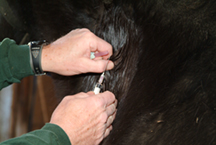
April 21, 2005
Unpredictable weather, disease carriers make protection paramount
After the release of this article, the Centers for Disease Control and Prevention (CDC) announced approval of two more ingredients as effective and safe as mosquito repellents. The ingredients are picaridin and oil of lemon eucalyptus and join DEET as approved for protecting against mosquitoes. Further information is available online.
WEST LAFAYETTE, Ind. - Because a number of factors can affect the risks of falling victim to potentially deadly brain-swelling diseases carried by mosquitoes, Purdue University experts recommend that all horses be vaccinated and that people take precautions to avoid mosquito bites.

|
The number of cases of West Nile virus, and eastern and western equine encephalitis can vary due to temperatures, rainfall, regional seasonal differences and bird migratory patterns, according to veterinarians and entomologists. Encephalitic diseases are spread when mosquitoes suck blood from infected birds and then bite people, horses or other mammals. In addition, areas that don't experience insect-killing frost have a threat of these illnesses almost year-round.
In the Midwest, West Nile virus is the most common mosquito-transmitted disease, but outbreaks of the other diseases are possible.
"Because of these variable factors, the chance of contracting one of the mosquito-borne diseases in different parts of the country can change every year," said William Hope, Purdue equine community practice clinician. "So, we advise that all horses in North America be vaccinated against western and eastern equine encephalitis and for West Nile virus."
Ralph Williams, a Purdue entomology professor, said that the extremely wet winter in Indiana could mean more mosquitoes, but it will depend on how warm and wet the spring and early summer are.
"We may have a lot of mosquitoes early, but these are usually nuisance mosquitoes rather than the kind that carry the encephalitic diseases," he said. "The disease-bearing ones that pester Indiana and other temperate areas tend to appear later in the summer and the fall."
However, he said that people need to protect themselves anytime insects are around.
Some parts of the country already have experienced the first seasonal round of diseases transmitted by mosquitoes, including Florida where a horse died last month from eastern equine encephalitis.
Hope said horses must have inoculations early enough in the spring and fall to provide immunity throughout mosquito season.
Previously vaccinated horses receive the West Nile vaccine at least twice annually in temperate climates, such as the Midwest, and as often as three times annually for the southern and western areas where mosquitoes often are present all year, Hope said. In addition, foals of previously vaccinated mares should be vaccinated beginning at 3 or 4 months of age.
There is no indication that the West Nile shots are harmful to pregnant mares. However, it is best to vaccinate mares before breeding season, Hope said.
The first time a horse is vaccinated, it must have two shots given three to six weeks apart. A booster should follow those shots every four to six months, depending on the risk of contracting the disease. The shots should be given from late February through April and then again in August through October, depending on the region of the United States.
Horses must be vaccinated for each of the diseases, which can be done in three separate shots or in a combined inoculation. Experts suggest that horses in the southern states be vaccinated for Venezuelan equine encephalitis, which sometimes strikes in states bordering Mexico. Horses that travel to those areas or to Central or South America also should be vaccinated for Venezuelan equine encephalitis.
Although reported cases of the most well-known of the encephalitic diseases, West Nile virus, have dropped sharply in the Southeast and Midwest since the height of the epidemic in 2002, the illness was staggering last year in other parts of the country. In 2004, California had 538 West Nile cases in horses, while Indiana only reported 11. The disease now occurs in almost every area of North America.
Writer: Susan A. Steeves, (765) 496-7481, ssteeves@purdue.edu
Sources: William Hope, (765) 494-8548, hopew@purdue.edu
Ralph Williams, (765) 494-4560, rew@purdue.edu
Ag Communications: (765) 494-2722;
Beth Forbes, forbes@purdue.edu
Agriculture News Page
Related Web sites:
Purdue School of Veterinary Medicine
Purdue Department of Entomology
Purdue Extension resources for West Nile virus
Animal and Plant Health Inspection Service
Centers for Disease Control and Prevention West Nile virus information
Related story:
Experts offer tips to protect animals and people
PHOTO CAPTION:
Veterinarian William Hope, Purdue equine community practice clinician, prepares to inoculate a horse against potentially deadly mosquito-borne diseases including West Nile virus, eastern equine encephalitis and western equine encephalitis. (Purdue University Agricultural Communication file photo/Michael Kerper)
A publication-quality photo is available at https://ftp.purdue.edu/pub/uns/+2005/hope-encephalitis.jpg
To the News Service home page